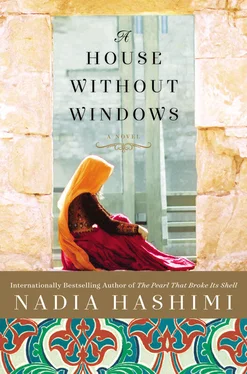She started from one corner and moved across the rectangle systematically. The carpet wobbled pathetically under her blows.
Zeba moved her aim downward and dealt the carpet a few more sharp smacks. When her stick snapped in two, she let out a sharp cry, then picked up a broom handle and took up again where she’d left off. Thump, thump, thump. She grunted between blows, puffs of dust rising violently from the tapestry like tubercular coughs.
When she got down to the last square foot of rug, Zeba stopped. She was panting. Her shoulder burned, and she sat on an overturned plastic bucket to catch her breath and let the muscles of her arm rest.
A bitter chill had settled over the village. Even indoors, the children’s fingers blanched with cold. She took the carpet inside and spread it out on the floor, its colors no brighter than they were before she’d attacked its wool fibers. This, for some reason she could not put into words, brought tears to her eyes.
Zeba blew on her hands and rubbed them together. She turned when she heard the door clang behind her. Kamal unwound his black scarf and tossed a bag of walnuts and raisins on the table. Zeba smiled weakly at him, thinking his timing could not have been better.
“How perfect,” Zeba had declared, reaching for the kettle. “Basir’s just brought back some fresh bread. I’ll make some tea. It’ll warm our bellies.”
“It’s not for them. They can eat what’s left from last night. I bought this for myself,” he declared.
Something in Kamal’s voice prickled Zeba’s skin. She looked up, abruptly. Kamal averted his eyes just as she turned to him. She watched closely as Kamal hung his hat and jacket on a hook in the hallway. She saw the slouch of his shoulders, the defiance in his chin, and the shadows around his eyes. How long had they been there without her seeing? She could barely breathe, her throat thick and tight.
Her voice faltered.
Kamal watched her from the corner of his eye. He did not move toward her or away from her. They stood in measured space, precisely six steps apart from each other, his feet planted firmly on the carpet she’d tried to clean just moments ago. He could see the rare silver threads in her hair. She could almost feel the stubble on his face, the face that had rubbed against hers just last night when Kamal had pressed himself into his wife despite her small pleas of protest. Zeba’s dusty fingers flittered to her lips.
But he’s my husband. How could this be?
It was in him, that thing she could not name. That thing she could not speak.
“Zeba,” he said, turning his broad back to her. “Don’t look for trouble.”
ZEBA WAS BROUGHT TO A ROOM NEXT TO THE PRISON’S ADMINISTRATIVE office, a room just large enough for a table and two chairs. One large window looked out onto the fenced-in yard and blank walls. Zeba took a seat across the table from a sable-eyed boy who looked as if he should be holding a schoolbag instead of a briefcase. He had short, curly hair and a smooth face.
Oh, Rafi. What were you thinking?
The boy cleared his throat before greeting her. He put a hand on his chest and nodded his head as he introduced himself.
“Good afternoon. My name is Yusuf and I’ll be your attorney. We have lots to discuss.”
Zeba could not believe this was the lawyer her brother had hired. He looked so young he should be defending nothing more serious than a goalpost. Her heart fell; she would certainly be hanged before the end of summer.
“I’ve read through the arrest registry and the police report. But I’m here to listen to you. Where do you want to begin?”
Zeba rested her forehead on her palm and stared at the table. Yusuf was unsure how to interpret this.
“Perhaps I should go first?” he offered.
Yusuf started to pace the small room. He was shocked, he told her, that she wasn’t killed immediately by the villagers or by her husband’s family.
“It’s just not. . it’s not the way things are done. I can’t believe they simply shrugged their shoulders and decided to hand you over to the police when we all know who really polices the villages. Completely unexpected and unprecedented, and we have to focus on that because that’s important. That’s quite critical, actually.”
Her village was not being noble or particularly lenient, Zeba thought, but she kept that to herself. This man knew nothing about her husband or her neighbors.
Yusuf described the barriers he’d faced in even getting this far, in setting up a time to meet with her. He had pored over the prison’s file and the police reports and decided they were in for a tough fight. He needed to talk with her family and anyone she could think of who would speak on her behalf. There were many procedural codes that hadn’t been followed, he emphasized. He slipped a finger into the knot of his tie and tugged at it impatiently, as if it was preventing him from talking as fast as he needed to.
Zeba wondered if there could be some mistake. Was it possible Rafi had hired a different lawyer for her? It would make much more sense if this man were actually assigned to a different inmate, one of the women accused of falling in love, perhaps. He looked like he would be much more suited to the problems of the lovesick.
Yusuf pulled a chair opposite her and met her eyes. Zeba instinctively turned away.
“I need to know what happened. I need to know everything about that day and what kind of man your husband was.”
Zeba met his questions with silence. He explained politely, then urgently, why she needed to cooperate with him. Zeba said nothing and wondered which of her cellmates would fall for him first, Mezhgan or Nafisa. Maybe even cool-as-ice Latifa would melt for his boyish charms.
YUSUF RETURNED TWICE MORE AFTER THAT VISIT. ZEBA STILL refused to breathe a word. She moved her attention to the wooden table before her, her eyes tracing the pattern of the grain like a mouse through a maze. Yusuf could read nothing from the expression on her face. He cleaned the dust from his glasses with the end of his tie, waiting for a response.
“I’m here to help you. Do you not understand that? Do you know what will happen to you if — or maybe I should say when —you’re found guilty of these charges? Khanum, we’ll be meeting with the judge sometime soon and you’ve given me nothing to work with, no way to defend you or. . or. . or. .”
Yusuf threw his hands in the air. He wore his brown suit today, the same one he’d worn the first time he’d visited his client. Zeba had noticed its even stitching, the careful pleats in the front. This was not a suit purchased locally. Yusuf was not dressed like any man from her village. His words, his clothes, the way he looked at her — everything about him smelled of something foreign.
“I have a question,” Zeba said flatly. She looked up at Yusuf.
He paused.
“Where are you from?” she asked. Yusuf was silent, confounded by his client’s simplicity. Her brother had promised that she was a good woman, that she was a gentle, loving mother. She was not a killer, he promised.
“Khanum, what does it matter where I’m from? Mazar, Kabul, Paghman. What difference would it make?”
“It makes all the difference in the world, young man. If you are not from my village, you don’t know what fruits will grow in my soil. You think you can plant an orange tree in my neighborhood? It’ll die before you finish wiping the sweat from your forehead. Because you don’t know where I come from.”
“I’m not talking about planting trees, Khanum. I’m talking about murder and jail and death. I’m talking about ways to defend you from some serious charges.” Yusuf was frustrated. Did she not understand the gravity of the situation?
Читать дальше











